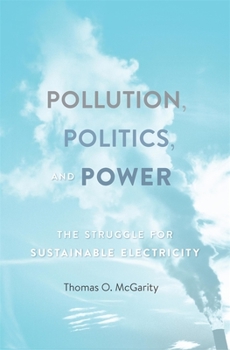Pollution, Politics, and Power: The Struggle for Sustainable Electricity
Select Format
Select Condition 
Book Overview
The electric power industry has been transformed over the past forty years, becoming more reliable and resilient while meeting environmental goals. A big question now is how to prevent backsliding.
Pollution, Politics, and Power tells the story of the remarkable transformation of the electric power industry over the last four decades. Electric power companies have morphed from highly polluting regulated monopolies into competitive, deregulated businesses that generate, transmit, and distribute cleaner electricity. Power companies are investing heavily in natural gas and utility-scale renewable resources and have stopped building new coal-fired plants. They facilitate end-use efficiency and purchase excess electricity produced by rooftop solar panels and backyard wind turbines, helping to reduce greenhouse-gas emissions. But these beneficial changes have come with costs. The once-powerful coal industry is on the edge of ruin, with existing coal-fired plants closing and coal mines shutting down. As a result, communities throughout Appalachia suffer from high unemployment and reduced resources, which have exacerbated a spiraling opioid epidemic. The Trump administration's efforts to revive the coal industry by scaling back environmental controls and reregulating electricity prices have had little effect on the coal industry's decline. Major advances therefore come with warning signs, which we must heed in charting the continuing course of sustainable electricity. In Pollution, Politics, and Power, Thomas O. McGarity examines the progress made, details lessons learned, and looks to the future with suggestions for building a more sustainable grid while easing the economic downsides of coal's demise.Format:Hardcover
Language:English
ISBN:0674545435
ISBN13:9780674545434
Release Date:November 2019
Publisher:Harvard University Press
Length:552 Pages
Weight:2.05 lbs.
Dimensions:1.8" x 6.2" x 9.3"
Customer Reviews
0 rating





